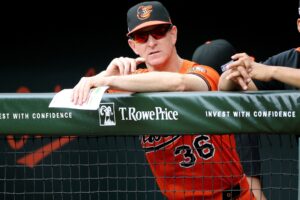
One of the more interesting questions to be answered in the Orioles’ second half is the future of Tony Mansolino.
Mansolino was named interim manager on May 17th, and the Orioles have a decent record, 28-24, under him. The Orioles went 15-28 under Brandon Hyde.
Hyde was informed on Preakness Saturday that he was being relieved of his duties. Mansolino learned about his new role just hours before managing his first major league game.
“I didn’t ask for this,” Mansolino said. “That morning when that happened, that was as big a shock to me as it was to you guys. When you get thrown into the fire, you’re just trying to get your feet settled and adapt.
“I do think I’ve been prepared for this for a long time … My training and my experiences in the past in this game and the people I’ve been so fortunate to be around, I think all that probably expedited my process. I think it happened a little quicker because of the history I have in this game
“I don’t think you can ask anybody like me to walk into that situation, which was shattered on Day 1, which is how this thing felt. It was tough. That was a tough scenario for all of us. It still is in some ways, and to be comfortable within a week, that’s not going to happen. It shouldn’t happen. That wouldn’t be the right thing by me or by anybody else.”
Most interim managers aren’t retained. The last time the Orioles had an interim was in 2010 when Juan Samuel replaced Dave Trembley in early June. Buck Showalter succeeded Samuel two months later.
This time, Mansolino appears to have 67 more games to prove himself, and he’s proven adept in personal relationships and game strategy.
There are two excellent books about baseball managers currently out, “The Last Manager,” by John W. Miller, which chronicles Earl Weaver’s life and career, and “Skipper” by Scott Miller.
John Miller’s book has been written about here, by both John Eisenberg and myself. Scott Miller’s book, which I’m currently reading, is an essential book for anyone — fans and those in the media — who wants to understand contemporary managing and relationships between managers and the front office.
Sadly, Scott Miller died of pancreatic cancer last month at 62, just weeks after this wonderful book was published.
The biggest takeaway from “Skipper” is how important relationships with players are and how the best recent managers, Dusty Baker, Bruce Bochy, Terry Francona and Dave Roberts, have excelled in them.
Early in Mansolino’s tenure, he talked about what was important to him about dealing with players.
“It’s just making sure that people feel loved, that the players feel loved, that the staff feels loved, everybody feels heard, and that takes a lot of time and a lot of effort to listen and talk,” he said.
That’s not something likely to come from Hyde or Showalter.
Mansolino learned many of his people skills at Vanderbilt, where he was an infielder. His major was Human and Organizational Development.
“I don’t know that I could have picked out anything better for the job I’m sitting in right now,” he said earlier this season. “It’s people’s communications, it’s the psychology of an organization. It’s the environment in the clubhouse, it’s all the things you would possibly need and want walking into the job I’m sitting in, or even as a coach, that’s that major.”
Mansolino can expertly explain the science of coaching third base, which he did for four-plus years until he became interim manager. He’s also great at dealing with the media, another essential part of the job.
In Scott Miller’s book, he quotes Cito Gaston, who won two World Series with the Toronto Blue Jays. Gaston often bristled at the competitive Toronto media, whom he felt were trying to one-up each other, making it difficult for him to answer questions and looked enviously at smaller-market teams that didn’t have that media environment.
Mansolino answers even those questions he finds annoying, and looks to be positive.
“Right now, the biggest thing for me is to make sure this thing continues to go well,” he said on Sunday.
“We were in the national media every day for all the wrong reasons the first three weeks of doing this, and now it seems like we’ve been in the national media for the right reasons because we’re playing well. We’ve got good players.”
Executive vice president/general manager Mike Elias, who will make the decision on whether Mansolino is made the fulltime manager, has declined to comment on if he’ll even be interviewed after the season.
At worst, Mansolino has made a positive impression for future managerial openings, and at best, he’ll be back for 2026 and beyond.
“At the end of the year, once this thing is done and wherever this goes, I’ll have time to sit back and reflect on the fun part of this,” he said.
Call for questions: I answer Orioles questions most weekdays. Please send yours to: Rich@BaltimoreBaseball.com.
